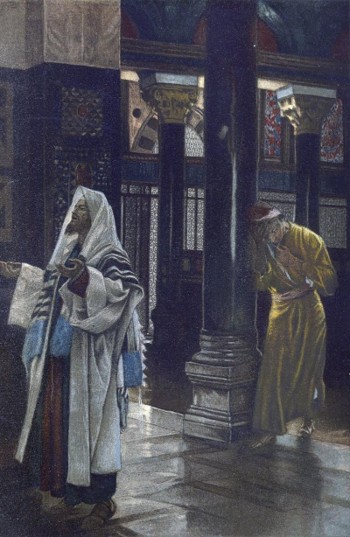Today’s devotional includes a practice known as Visio Divina, or ‘divine seeing,’ in which we prayerfully invite God to speak to us as we gaze at an image. This can be a work of art, a photograph, or something in nature. The desire is to encounter God’s presence in what we see and to respond. It is often practiced alongside Lectio Divina, or ‘divine reading,’ inviting us to contemplate the text also through the eyes of the artist, whether on our own or with others.

The Pharisee and the Publican by James Tissot (1899).
As you begin, pause, take a deep breath, and ponder the painter’s portrayal. Invite the Spirit’s leading and focus your attention on the text.
He also told this parable to some who trusted in themselves that they were righteous and regarded others with contempt: “Two men went up to the temple to pray, one a Pharisee and the other a tax collector. The Pharisee, standing by himself, was praying thus, ‘God, I thank you that I am not like other people: thieves, rogues, adulterers, or even like this tax collector. I fast twice a week; I give a tenth of all my income.’ But the tax collector, standing far off, would not even look up to heaven, but was beating his breast and saying, ‘God, be merciful to me, a sinner!’ I tell you, this man went down to his home justified rather than the other; for all who exalt themselves will be humbled, but all who humble themselves will be exalted.” (Luke 18:9–14 NRSV)
What words or phrases stand out to you? What is the Spirit highlighting? Why do you think they are catching your attention?
How are you like/unlike the Pharisee and the tax collector? How is the church?
In Jesus’s day, Pharisees were respected, well-educated, and wealthy, and this one had gone above and beyond the requirements of the law.
In contrast, tax collectors were known for their dishonesty and considered traitors, swindlers, collaborators with Rome. Not only were they deemed ritually impure, they were despised, a term that literally means ‘to count as nothing.’
But how does Jesus see them?
It has often been assumed that these men were going to the Temple to engage in private prayer, but Middle Eastern listeners would have assumed they were going to attend public worship, one of two daily atonement services expected of the Pharisee, but not a tax collector!
The tax collector remained ‘at a distance’—with the other ‘unclean’ individuals at the Eastern gate.
What do we notice about the descriptions of them?
Commentators and historians have said that arrogance and self-righteousness were in the character of the Pharisees, literally ‘separated ones.’ In daily prayers, they thanked God they weren’t ‘a Gentile, a servant, or a woman,’ and were ‘not as the rest of men.’
This Pharisee assumed he was righteous before God, and so does everyone else—don’t we do the same, when a devoted, clean-living, tithing person attends a service?
In contrast, the tax collector was ‘beating his breast’ (v.13) because that is where the heart, the source of sin in one’s life, resides. The Greek words for ‘have mercy’ refer to the atonement sacrifice. He in effect prayed, ‘Make an atonement sacrifice for me, a sinner.’ He knew he was a hopeless case. . .
Except for the grace of God.
Which leads us to the astonishing conclusion of the parable:
[The tax collector] ‘was the man who went home justified in God’s sight, rather than the other one’ (v.14).How might pride and self-righteousness keep us from the unity of the Spirit, from genuine relationship with our neighbours? How might we humble ourselves and trust God’s mercy, not only for ourselves but for our neighbours?
I live in the high and holy place
with those whose spirits are contrite and humble.
I restore the crushed spirit of the humble
and revive the courage of those with repentant hearts. (Isaiah 57:15 NLT)
What might we learn from the parable of the Pharisee and the tax collector? What’s your takeaway?
Pray the passage, for example, ‘God, be merciful to me, a sinner’ (v.13)!
Thank You, Lord, that Your steadfast love never ceases, Your mercies never come to an end; they are new every morning; great is Your faithfulness (Lamentations 3:22–23).
Ask the Spirit to show you God’s mercy and grace at work in the lives of your neighbours today and to help you share it with all whom you meet.
Dr. Karen Wilk is on the NAB Missional Initiatives Team and lives in Edmonton, Alberta.